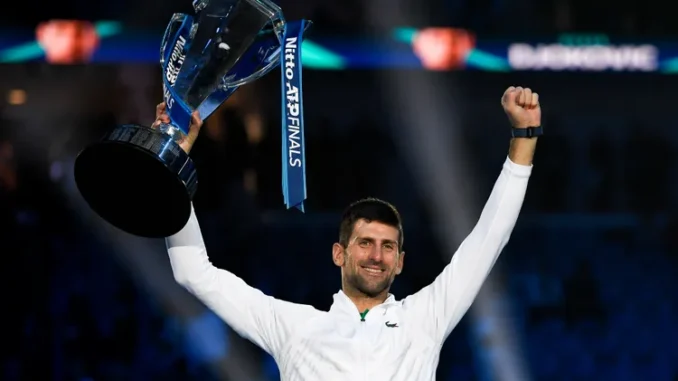
In the pantheon of tennis greatness, where legends like Roger Federer and Rafael Nadal have long cast towering shadows, one man has carved out a legacy that transcends mere statistics—Novak Djokovic. On March 28, 2025, as the Miami Open semifinals showcased his relentless brilliance with a 6-2, 6-3 dismantling of Grigor Dimitrov, the conversation around Djokovic’s supremacy took a fresh turn. Patrick Mouratoglou, the renowned coach who guided Serena Williams to a decade of dominance and now mentors Naomi Osaka, stepped into the fray with a bold declaration: Djokovic’s mental fortitude sets him apart as the greatest of all time. “He is the best of all-time mentally,” Mouratoglou asserted, his words cutting through the noise of a sport often dazzled by Federer’s elegance and Nadal’s tenacity.
Picture the scene: a teenage Djokovic, barely known beyond Serbia’s borders, striding onto the ATP Tour in the mid-2000s. Federer and Nadal were the undisputed kings, their trophy cabinets overflowing with Grand Slams, their aura intimidating even the boldest challengers. Most players, Mouratoglou recalled, saw them as untouchable titans. “All the other guys were thinking these two are unbeatable,” he said, painting a vivid picture of a tour resigned to bowing before the ‘Big Two.’ Then came Djokovic, a wiry upstart with a glint of defiance in his eye. Before a Grand Slam clash with Federer, he didn’t just whisper confidence—he proclaimed it. “I’m going to beat him,” he told interviewers, a statement so audacious it drew gasps and scorn. “Straight away the reaction to these comments was really negative,” Mouratoglou remembered, noting how the tennis world bristled at this perceived disrespect. Yet, Djokovic’s belief wasn’t bravado—it was prophecy.
That unshakable self-assurance, Mouratoglou argues, is the cornerstone of Djokovic’s edge. While Federer dazzled with artistry and Nadal conquered with physicality, Djokovic built his empire on an ironclad mind. “Mentally Novak is the strongest of the three,” Mouratoglou insisted, pointing to a record that now stands at 24 Grand Slam titles—two more than Nadal’s 22 and four ahead of Federer’s 20. It’s a tally that’s hard to argue with, even if it ruffles feathers among fans who adore Federer’s grace or Nadal’s grit. “It doesn’t please people when you say he is the best because the other two are more liked than Novak, but this is undeniable now,” he added, acknowledging the Serbian’s polarizing presence. Djokovic’s game—less flashy than Federer’s, less punishing than Nadal’s—relies on a mental resilience that turns matches into wars of attrition he rarely loses.
Consider his rise. When Djokovic broke into the top 10, he faced a gauntlet of defeats against Federer and Nadal, losing most big matches for years. But something shifted around 2010-11, a pivot Mouratoglou ties to an unshakable belief that couldn’t be taught. “You can’t teach confidence like he had,” he said, emphasizing that it’s an innate quality Djokovic cultivated through relentless dedication. “You look at what he is doing every day in his life and it gives Novak so much confidence. He builds his life around being the best he can be and he is the only one doing this.” From his meticulous diet to his grueling training regimen, Djokovic’s lifestyle is a fortress of discipline, each brick laid with the singular goal of outlasting and outthinking his rivals.
The numbers back it up. With 428 weeks as world No. 1, 40 Masters 1000 titles, and a career Golden Slam sealed by last year’s Olympic gold, Djokovic has eclipsed his peers in sheer achievement. Mouratoglou marvels at how this mental giant turned perceived weaknesses into strengths. “When you look at Novak’s game and compare it to Roger and Rafa, you say how can this guy with this game have a better record than the other two,” he mused, answering his own question with a nod to that mental supremacy. It’s not about prettier strokes or brute force—it’s about a mind that refuses to yield, even when the crowd turns or the odds stack high.
Djokovic’s Miami run, where he’s now one win from a record seventh title and his 100th career trophy, is just the latest chapter. Facing Dimitrov, he served with surgical precision—87 percent first-serve accuracy—and weathered early pressure to seize control. It’s the kind of performance that echoes Mouratoglou’s point: when the stakes rise, Djokovic’s mind sharpens. As he prepares to battle Jakub Mensik in the final, the tennis world watches a man who, in Mouratoglou’s eyes, has redefined greatness—not with flair or ferocity, but with a mental mastery that outshines even the brightest stars of Federer and Nadal’s golden eras. Love him or not, Djokovic’s reign is a testament to the power of belief, a legacy forged in the crucible of his own unyielding will.
Leave a Reply